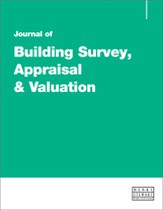Ground water assessment and the design of basement waterproofing
Abstract
This paper discusses the importance of groundwater risk assessment in basement waterproofing design. It discusses why it is required to allow the design of a cost-effective waterproofing system and also to determine whether the simple design approach in BS8485 can be used to assess risk from ground gases. It is also an important part of assessing the risk of vapour intrusion into basements from hydrocarbon contamination. External drainage for basements can be designed to be an effective and durable solution that lowers the hydrostatic pressure on the waterproofing system. It does require discharge to an outfall, however, and discharge to sewers is not appropriate, because water companies will not allow groundwater to be drained into public sewers. The rate of groundwater flow may also exceed the allowable discharge rates that are used in sustainable drainage (SuDS) design. This limits where external drainage can be provided to locations where a soakaway or a watercourse is available for discharge. The same constraints should also apply to cavity drain discharges. Where a basement is located in hydrocarbon contaminated groundwater or ground gas is present (such as methane or carbon dioxide) it is important to complete an appropriate risk assessment that considers whether flow into the basement will be via gas/vapour phase migration above the groundwater or dissolved phase below it. The simple screening and points system in BS8485 is not suitable where basements are below the groundwater table. The durability of materials (membranes, cavity drains, etc.) in contact with contaminants also needs consideration. Where contamination such as dissolved methane is present, cavity drains will require intrinsically safe pumps. Groundwater and contamination intrusion assessments are best completed by qualified ground engineering professionals and SoBRA accredited risk assessors for permanent gas and/or vapour intrusion respectively.
The full article is available to subscribers to the journal.
Author's Biography
Steve Wilson is a Chartered Civil Engineer and UK Registered Ground Engineering Adviser. He is a Society of Brownfield Risk Assessment (SoBRA) accredited risk assessor for permanent gas (ground gas) and vapour intrusion. He has worked in the field of geotechnical engineering and contaminated land for over 30 years in the UK and internationally. This has included design of dewatering and ground water drainage schemes and the investigation of leaking basements, as well as design of gas and vapour protection for basements. Steve has undertaken assessments of groundwater conditions to inform both the structural and waterproofing design of basements. He is the author of numerous guidance documents and technical papers on the subject of ground gas assessment and mitigation design, including the 1999 Wilson and Card paper in Ground Engineering on which the Characteristic Situations and Gas Screening Values in BS8485 are based.
Alwyn Hughes is a Certified Surveyor of Structural Waterproofing (CSSW). He has extensive experience within the construction sector with a particular expertise in structural waterproofing design for both small-scale domestic projects and large-scale industrial/residential projects. Alwyn has designed combined ground gas protection and waterproofing for projects within the UK and internationally.
Citation
Wilson, Steve and Hughes, Alwyn (2023, June 1). Ground water assessment and the design of basement waterproofing. In the Journal of Building Survey, Appraisal & Valuation, Volume 12, Issue 1. https://doi.org/10.69554/DAKX9859.Publications LLP
